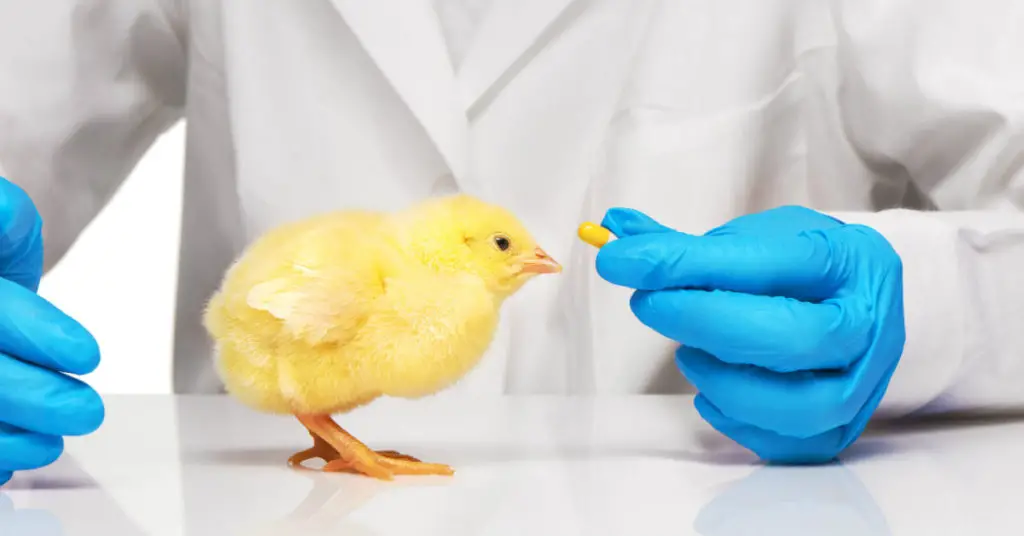Translated by Nick R
Well, both common poultry and caged pet birds need to be vaccinated to prevent diseases from viral, bacterial, fungal or parasitic pathogens.
Pay special attention to your bird’s vaccination before it’s too late!
Table of Contents
What are vaccines for?
Vaccines were designed to prevent, essentially as a booster for the bird’s immune system. In the event that the bird becomes ill in the future, if vaccinated, it will be less likely to get seriously ill or die in the worst-case scenario.
Vaccination is a supremely important preventive measure for all types of pets and especially in birds, as they normally live in colonies or groups in captivity, which, in a possible case of infection would facilitate the spread.
The vaccine is basically composed of the same pathogen, either attenuated (“gagged”), inactivated (killed), recombinant (with a bacterium as a vector), or toxoid (toxins of the pathogen); with which it seeks to generate a natural immune response of the same animal.
What are the drugs useful for?
In addition to vaccines, domestic birds need specific medications and veterinary care to maintain their quality of life. Medications are useful to prevent, treat diseases when the bird is already sick or diagnose diseases through, for example, tests.
Their composition is based on pharmaceutical drugs or integrated chemical substances and they can be synthetic or from the extraction of natural compounds.
Which vaccines are necessary for pet birds?
Diseases are mainly caused by external biological agents such as parasites, fungi, bacteria, and viruses. Vaccines usually act against the latter.
Avian pox vaccine
Bird pox is a disease caused by the Variola avium virus that is very resistant to environmental conditions. Sick birds can contract the disease unnoticed in mild stages, since, in more advanced signs, blisters on the wattles and legs may be evident.
It’s very common to find hens affected by this disease, although some strains also affect turkeys, canaries, and pigeons.
At what age is it applied?
Birds should be vaccinated between 4 and 16 weeks of age. The vaccine only works for active immunization.
Is reinforcement needed?
Revaccination is not required if a proper initial vaccination is performed.
How is it administered?
The route of administration of the vaccine is by injection in the internal side of the wing.
Recommendation
Birds are in general very good at hiding their symptoms, it is a behavior that evolved to defend themselves from predators. So, I recommend you pay close attention to the symptoms and changes, whether physiological and physical, or behavioral. Don’t be overconfident just because your bird looks healthy at first glance.
Salmonella Vaccine
Salmonella is a disease caused by bacteria of the genus Salmonella (with more than 250 serotypes) and affects both poultry and some pet birds. Humans can contract the disease through zoonosis.
The vaccine is effective against most variants of Salmonella. In fact, it provides both active and passive immunization. Active immunization is by application. Passive immunization is intended for hatchlings of vaccinated parents, who transfer immunity to their chicks up to 14 days after hatching.
At what age is it applied?
The vaccine should be given after 4 weeks of age. If there is a risk of infection during rearing, day-old chicks should be vaccinated (consult your veterinarian).
Is reinforcement needed?
Yes, a second dose should be applied before 16 weeks of age. After the second dose, the bird has approximately 57 to 60 weeks of protection.
What method is used?
The vaccine is administered by intramuscular injection.
Avian Encephalomyelitis Vaccine
Encephalomyelitis is a disease caused by the Picornavirus virus. It mainly affects young birds between 1 and 3 weeks of age, causing tremors. Be careful! There is no treatment and the disease can cause the death of the bird.
At what age is it applied?
The vaccine should be given to birds from 10 to 12 weeks of age. It should never be given to birds younger than 3 weeks old. Prevention in young birds under 3 weeks of age is through vaccination of the parents or passive vaccination.
Is reinforcement needed?
It is not necessary, since birds will become more resistant to the disease after 3 weeks of age after being vaccinated.
What method is used?
The dose can be administered orally in drinking water combined with other vaccines (fowlpox) or drugs and by injection in the wing membrane.
Fowl Cholera Vaccine
Fowl cholera is a highly contagious disease caused by the bacterium Pasteurella multocida, which affects both domestic and wild birds.
In addition to good hygiene, vaccination is required to prevent the disease. Just as there are viral vaccines, there are also bacterial vaccines, called bacterins. Fowl cholera is one of the diseases that is prevented by this type of vaccine.
At what age is it applied?
It is recommended to apply the vaccine between 8 and 10 weeks of age and in chickens at 9 weeks or later.
Is reinforcement needed?
Yes, it should be boosted with applications at intervals of every 2 to 3 months.
What method is used?
Injection in the inner side of the wing fold.

Vaccine for the New Castle Disease
It is a disease caused by a virus of the Paramyxovirus family and affects birds, including poultry. Infection by this pathogen manifests itself by means of a respiratory infection with clinical signs such as depression and diarrhea.
Vaccination is the only way to prevent the disease, but if the bird has already been affected, it is necessary to quarantine it.
At what age is it applied?
The vaccine should be given to newly hatched birds before the first week.
Is reinforcement needed?
Yes, boosters are normally given at intervals varying between 60 and 90 days.
Method of application
The application of this vaccine can be done via intranasal, ocular, spray, or in drinking water.
Avian Influenza Vaccine
Avian influenza or also known as avian flu is caused by the virus of the genus Influenzavirus, causing the typical symptoms of flu as in any other species, such as sneezing, depression and nasal secretion. Although it is a disease originating in waterfowl, it can also affect domestic birds, both poultry and pets.
At what age is it applied?
It is recommended to apply the vaccine to healthy birds at 8 to 12 days of age.
Is reinforcement needed?
Yes, it requires revaccination 2 to 3 times within 6 to 7 weeks between applications.
What method is used?
The vaccine is administered subcutaneously in the middle and posterior regions of the neck.
What medications do pet birds need?
Medications are required for some diseases to prevent, treat and diagnose. Here are the three most common diseases in birds treated with medications.
Medication for Psittacosis in birds
Psittacosis is a very common disease in several species of domestic birds such as parrots, cockatiels, and parakeets. It’s also dangerous for us humans, as birds can transmit the infection to us (zoonosis).
The cause of this disease is the bacterium Chlamydiaphila psitacci, which affects the bird’s immune system to such an extent that it leaves the bird vulnerable to other diseases such as conjunctivitis.
A test for psittacosis can be used to detect the disease. If the symptoms appear, take your bird to the veterinarian for medication.
Treatment
- First, you must quarantine the bird to prevent spread and zoonosis.
- Treatment is partially through drugs or medications and partially through hygiene care for the bird. The bird must have excellent hygiene since the disease is caused by a bacterial infection.
- The pharmacological treatment is based on antibiotics such as doxycycline, azithromycin, or clarithromycin for at least 45 days, depending on age and weight.
Medication for Acariosis in birds
Acariosis is a disease caused by small external parasites called mites. This disease is common in all birds, especially those in captivity, usually due to a lack of hygiene. The symptoms are pronounced, and itching and irritation under the feathers will give you a warning.
If the hygiene in the house is failing and you have not been able to counteract the mites by cleaning your little friend and its environment, you must go to the veterinarian. He/she will most likely suggest the following:
Treatment
- As if it were lice, apply a spray of malathion to the feathers and skin with a concentration of 3-4 ml per liter of water.
- If the infestation persists you can repeat the application, but without overdoing it. Wait after the application to see if the medicine takes effect, so you will know if it is necessary to apply it again.
Medication for deworming pet birds
Apart from external parasites such as lice and mites, there is also the threat of internal parasites that can affect your bird at the digestive level.
The 3 most common internal parasites in birds
- Ascaris is a large roundworm that can be eliminated with Piperazine.
- Cecal worms are similar to Ascaris but smaller (12mm). It is treated with Piperazine.
- Tapeworms, also called flatworms, have a size of up to 15cm. The treatment is based on the use of triple vermifuges.
What you should know in addition to vaccines and medications for pet birds
Everything counts when caring for your pet, such as cleanliness and healthy habits recommended by the veterinarian. Here is some additional information.
Quarantine in birds
Taking into account everything you read above and if you already own any of the wonderful domestic species of birds that exist, I want to give you some advice regarding the addition of a new member to your family.
No matter how healthy the bird appears to be, without exception, it must go through this process. The new member, whether chick or adult, must spend a period of at least 6 weeks in isolation, with no contact whatsoever with other birds. This is in order to avoid diseases by means of special supervision, especially when it does not have the vaccines (if it has them too).
Conclusions
- Vaccination and the use of medicines in birds is definitely vital. Taking care of them is not only feeding them and cleaning their cage.
- More pedagogy and prevention and health promotion programs for domestic birds are needed. Although vaccines already exist, some owners overlook the fact that they are animals that require veterinary care just like dogs and cats.
- The response to the vaccine in birds depends to a great extent on the host and its environment since the vaccine only promotes the response of the immune system.
You may be interested in


